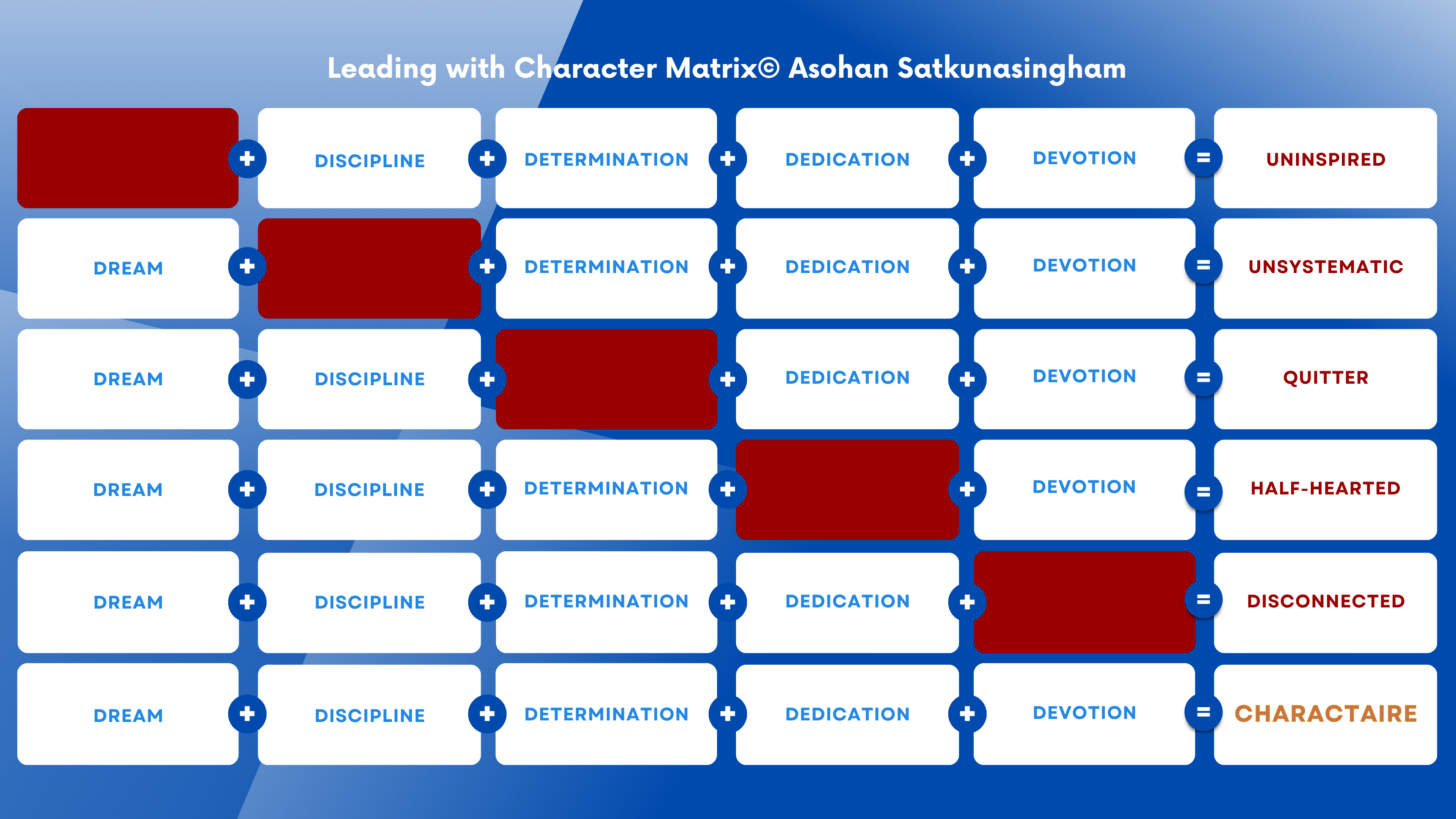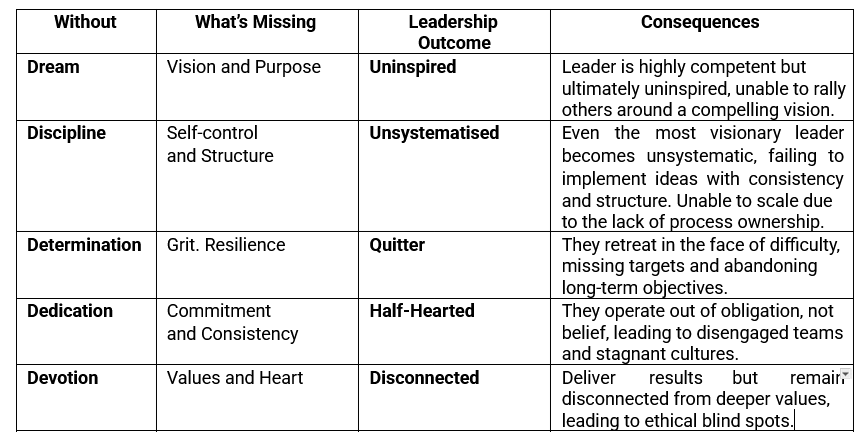
Introduction
In the evolving landscape of corporate governance, the spotlight is shifting from technical competencies to character-based leadership. While strategy and systems remain essential, it is the character of those who lead that ultimately determines a company's trajectory.
In Corporate Malaysia, recent governance failures and ethical lapses have exposed the limitations of relying solely on competence. Leaders today must not only be capable but must lead with integrity, accountability, and purpose.
The Leading with Character Matrix introduces a fresh yet timeless framework built on five core ingredients of character-driven leadership: Dream, Discipline, Determination, Dedication, and Devotion. This article explores how this matrix strengthens corporate governance and examines the consequences when these traits are absent.
When Boeing's 737 MAX crisis unfolded, Volkswagen's emissions scandal broke, or Lehman Brothers collapsed, the public swiftly judged the character of those at the helm. And yet, most leadership development programs remain heavily weighted toward technical skills, with little room for conversations about character.

This gap between what we judge in failed leadership and what we prioritize in leadership development creates real business consequences. Research by KRW International reveals that:
Average ROA for CEOs with high character ratings
Average ROA for CEOs with low character ratings
Nearly five times higher performance for character-driven leaders.
The Current Pain Points in Corporate Malaysia
Despite strides in sustainability and innovation, Corporate Malaysia faces persistent challenges in leadership and governance:
Key Challenges:
- Mounting ESG Pressure: As ESG principles become central to corporate identity, boards are expected to demonstrate not only compliance but also character in leadership decisions.
- Leadership Trust Deficit: The 2023 Edelman Trust Barometer found that only 52% of Malaysians trust business leaders to do what is right — a telling indicator of public scepticism.
- Governance Failures: Several high-profile cases involving GLCs and listed companies revealed weak ethical foundations, poor transparency, and inadequate accountability.
- Employee Engagement Concerns: According to PwC Malaysia's 2023 Workforce Survey, 36% of employees feel their leaders lack authenticity and character, affecting morale and organizational culture.
The Character Matrix Explained
Based on my book "Charactaire: Quintuple Secrets for Character Richness," the Leading with Character Matrix outlines five essential traits for transformative leadership:
Dream
Vision and purpose
Discipline
Self-control and structure
Determination
Grit and resilience
Dedication
Commitment and consistency
Devotion
Values and heart
Each element contributes uniquely to a leader's impact. Their absence results in a leadership archetype that weakens organizational outcome.

The Charactaire Leader
In contrast, a Charactaire Leader, one who embodies all five traits has:
- Purpose (Dream)
- Process (Discipline)
- Perseverance (Determination)
- Passion (Dedication)
- Principle (Devotion)
Such leaders inspire trust, deliver ethically, and generate sustained value. Traits essential to governance, culture, and long-term performance.
This matrix serves as a blueprint for cultivating character-rich leadership essential for strong governance. This is a new concept and I hope the conversation along it continues. In this way, this new approach may give rise to a new breed of leaders; leaders with character.
Why This Matters for Corporate Governance
Character-based leadership is not an idealistic philosophy. It is a strategic necessity. It lays the foundation for:
- Ethical and sound decision-making
- Greater transparency and accountability
- Resilient leadership amid volatility
- Enhanced employee engagement and culture
- Long-term stakeholder trust and value creation
Critical Insight: Workplace studies over the past six decades show that the share of jobs requiring employee decision-making has grown from 8% to 34%. Today, over a third of the workforce makes judgment-based decisions daily. Character is no longer optional. It's embedded in every level of decision-making.
Final Thoughts

In the age of ESG, digital disruption, and rising stakeholder activism, character is no longer a soft skill. It is the hard edge of modern leadership. The Leading with Character Matrix offers a mirror and a map for cultivating leadership that is both effective and ethical.
Research increasingly shows that character-driven leadership is not only ethically sound but commercially smart. It correlates with stronger financial performance, greater employee engagement, and higher levels of innovation. Organizations that invest in developing leadership character are not merely upholding values; they are building a sustainable competitive edge.
As Malaysia seeks to strengthen its corporate governance and leadership pipelines, the time has come for CEOs, Boards, and CHROs to embed character assessments into leadership selection, succession planning, and development.
The future of leadership is not just about competence. It's about character. And integrity is the new bottom line.
References
- Edelman. (2023). 2023 Edelman Trust Barometer: Malaysia report. Edelman.
- Harvard Business Publishing Corporate Learning. (2022). Leadership Reframed for the Workplace of the Future: 10 Capabilities and 7 Superpowers.
- KRW International. (2015). Return on Character: The Real Reason Leaders and Their Companies Win.
- Muro, M., Liu, S., Whiton, J., & Kulkarni, S. (2017). Digitalization and the American workforce. Brookings Institution.
- PwC Malaysia. (2023). Malaysia's workforce hopes and fears survey 2023. PricewaterhouseCoopers.
- Satkunasingham, Asohan. (2024). Charactaire: Quintuple Secrets for Character Richness. Kuala Lumpur, Malaysia. Character Quotient.




